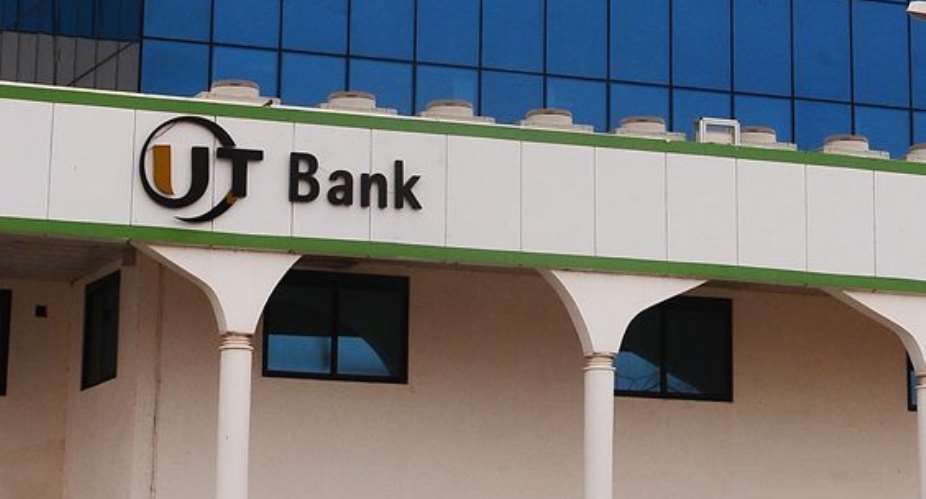UT Bank was found to be the most at-risk bank in Ghana listed on the stock exchange, before its collapse, in a 2016 study by Eric Dei Ofosu-Hene of the University of Ghana Business School and Peter Amoh of FinRisk Solutions.
The research (which can be found here ) indicated that indigenous banks were more at risk than foreign owned banks, possibly, because the foreign banks adhered to stricter standards.
The objective of their study was to construct an overall risk index to ascertain risk level of banks listed on Ghana Stock Exchange (GSE) and to ascertain whether there is a significant relationship between risk management and bank performance.
Secondary data of all listed banks on GSE over the period 2007–2014 was used for the study and their findings show that banks listed on Ghana Stock Exchange have declining risk indexes on average over the latter part of the study period.
According to the researchers, this meant the Bank of Ghana (BoG) may have to impose additional prudential and regulatory requirements, i.e. regulations to mandate financial firms to control risks and hold adequate capital as defined by capital requirements. This would ensure that banks remain solvent.
“Based on the summary of risk level of GSE listed banks computed using the risk index suggested by Hannan and Hanweck (1988), it was found that, the safest GSE listed bank for period under study was SGG Societé Generale Bank. General impression is that, indigenous Ghanaian listed banks has lower risk index relative to foreign listed banks. However, the most risky GSE listed bank was UT bank,” the study noted.
UT Bank's woes
The GSE suspended the listing status of UT Bank following its collapse, subsequent takeover by GCB Bank and the revocation of its licence by the Bank the of Ghana because of its heavy capital impairment.
The GSE noted that UT Bank has failed to publish its financial results since December 31, 2015.
UT Bank had its licence revoked alongside Capital Bank , which also collapsed and has been taken over GCB Bank.
UT Bank's current challenges are linked to its high non-performing loans portfolio, which has greatly affected the bank's financial performance.
The inability of the company to disclose its financials also led to a seizure of its operations temporarily by the Ghana Stock Exchange in January 2017.
UT Bank, formerly known as Best Financial Services, later UT Financial Limited, was incorporated on April 18, 1996 under the Companies Code, 1963 (ACT 179) as a private limited liability company.
On February 19, 1997, the Bank of Ghana formally granted the company a license to operate as a non-bank financial institution and a certificate to commence business on April 24, 1997.
UT Bank was founded by Prince Kofi Amoabeng and Joseph Nsonamoah on April 18, 1996 and is headquartered at Airport, in Accra, Ghana.
–
By: Delali Adogla-Bessa/citifmonline.com/Ghana





 Lay KPMG audit report on SML-GRA contract before Parliament – Isaac Adongo tells...
Lay KPMG audit report on SML-GRA contract before Parliament – Isaac Adongo tells...
 Supervisor remanded for stabbing businessman with broken bottle and screwdriver
Supervisor remanded for stabbing businessman with broken bottle and screwdriver
 NDC watching EC and NPP closely on Returning Officer recruitment — Omane Boamah
NDC watching EC and NPP closely on Returning Officer recruitment — Omane Boamah
 Your decision to contest for president again is pathetic – Annoh-Dompreh blasts ...
Your decision to contest for president again is pathetic – Annoh-Dompreh blasts ...
 Election 2024: Security agencies ready to keep peace and secure the country — IG...
Election 2024: Security agencies ready to keep peace and secure the country — IG...
 People no longer place value in public basic schools; new uniforms, painting wil...
People no longer place value in public basic schools; new uniforms, painting wil...
 'Comedian' Paul Adom Otchere needs help – Sulemana Braimah
'Comedian' Paul Adom Otchere needs help – Sulemana Braimah
 Ejisu by-election: Only 33% of voters can be swayed by inducement — Global InfoA...
Ejisu by-election: Only 33% of voters can be swayed by inducement — Global InfoA...
 Minority will expose the beneficial owners of SML, recover funds paid to company...
Minority will expose the beneficial owners of SML, recover funds paid to company...
 Prof. Opoku-Agyemang has ‘decapitated’ the NPP’s strategies; don’t take them ser...
Prof. Opoku-Agyemang has ‘decapitated’ the NPP’s strategies; don’t take them ser...
